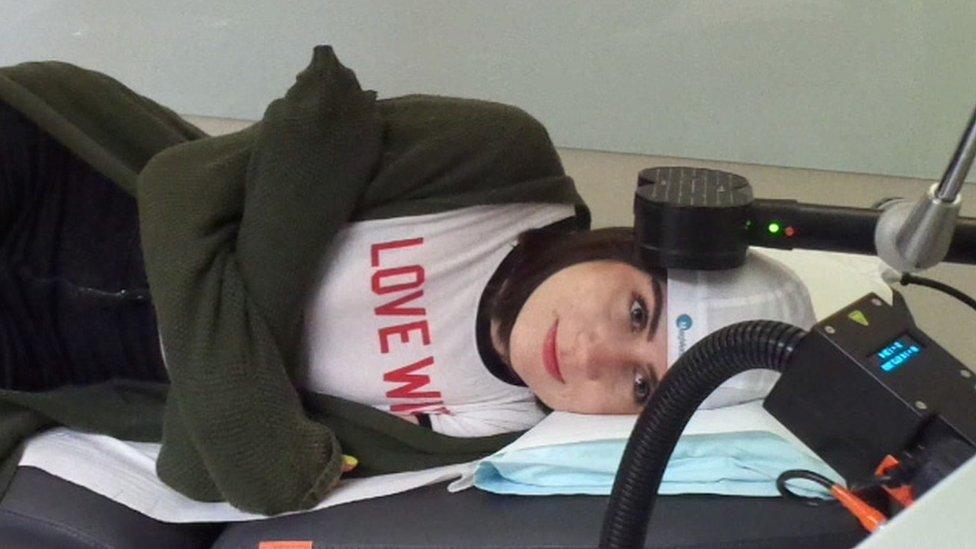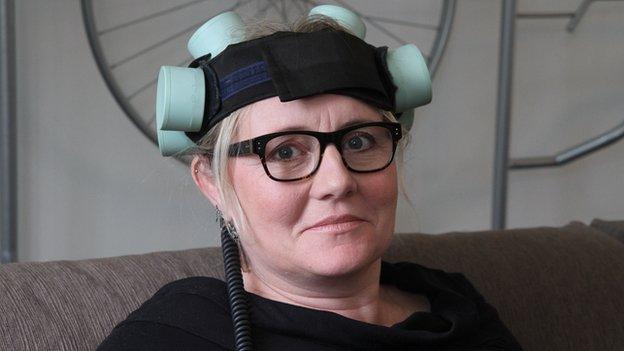'It's quite freaky, like something's prodding my brain'
- Published
Vlogger Dodie tells BBC Radio 5 live she is raising awareness of mental health issues by filming her treatment
Depersonalisation disorder, sometimes known as DPD, leaves sufferers feeling like they're not part of the world they live in.
"I feel spaced out a lot of the time. I feel like I'm not really here, like I'm living in a dream," says Dodie Clark, a 22-year-old musician and vlogger from London.
"I can't open my eyes wide enough or see things properly."
The mental health disorder can lead to severe depression as emotions, empathy and wellbeing give way to a detachment and distance from daily life.
Dodie says: "It's caused me to have depression and anxiety. I noticed suicidal thoughts creeping in and that was definitely the point where I thought I need some help."
What causes the condition is not yet understood - and treatments such as medication and counselling aren't always effective.
Dodie has suffered from depersonalisation for about two years, and is now trying out a fairly new treatment called trans-cranial magnetic stimulation.
Known as TMS, it is currently available in only two NHS trusts and a handful of private clinics. It is a mainstream treatment in the US, but not the UK.
Dodie allowed BBC Radio 5 Live to accompany her for a treatment at the Smart TMS clinic in Chelsea.
Face twitching
At first sight, the therapy looks similar to electro-convulsive therapy, a controversial intervention that passes electric shocks through the brain to cause a minor seizure, modifying brain activity.
However TMS is very different. No pads or probes actually touch the patient's head.
Instead, an electromagnetic coil sits a few inches above the targeted area.
Electromagnetic pulses are then generated that target the specific area of the brain thought to be causing the problem.
One effect of the electromagnetic pulse is unintended movement.

Dodie Clark is receiving treatment for feeling spaced out much of the time
In Dodie's case, the pulses make her jaw twitch with a regular clicking motion.
"At first, I was quite panicked by the whole situation, because it's quite freaky - like something's prodding your brain and making your face twitch when you don't want it to.
"A lack of control can be quite scary, but now I'm used to it," she says.
"When I first started getting ill, if I could see myself now, I'd be terrified. This is bizarre. But now that I'm here, I know it's not that bad. It's just a different kind of treatment, and it's important to show this."
"There's no shame in any of this. There's no shame in mental health or seeking treatment at all."
Is it effective?
The National Institute for Health and Care Excellence (NICE) says the treatment shows no significant safety concerns.
The institute says evidence about its effectiveness in the short term is "adequate" but "variable".
Dr Chris Kelly, a consultant psychiatrist and a fellow of the Royal College of Psychiatrists, is an experienced practitioner of electro-convulsive therapy and is familiar with the TMS treatment.
He says much more research is needed into its effectiveness in the field of depression.
"It may be useful to some people, particularly those who are intolerant to standard treatments," he says.
"At present, we know that it is of some use and not of particular harm.
"But the question is whether it's any better than established treatments that are already used to treat conditions like this - and that's what we don't yet know."
After completing her course of transcranial magnetic stimulation, Dodie hasn't so far found any improvement, and is undertaking other treatment.
However, she says she would still recommend that others consider it.
"For me, I didn't find any difference, and that's difficult to talk about. But I think it needs more recognition and for people to know about it."
Follow Ciaran on Twitter , external
- Published25 July 2017

- Published6 May 2014

- Published22 January 2014
